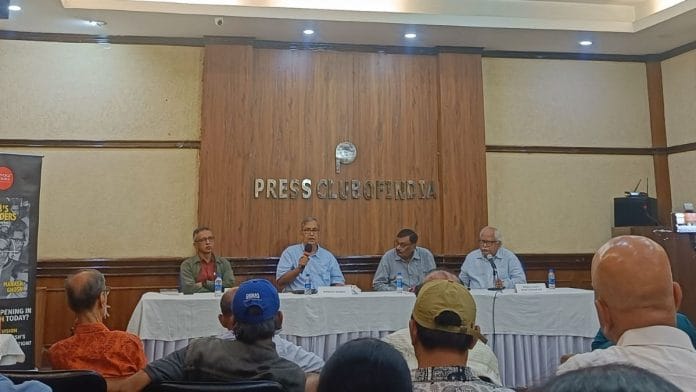New Delhi: It was an evening of anecdotes, analysis, and collective angst.
At the Press Club of India, the launch of senior war correspondent Manash Ghosh’s book, Mujib’s Blunders, on 21 July, turned from a reflective evening into a sharp reckoning with Bangladesh’s present as four senior journalists unpacked the recurring shadow of Pakistan over Bangladesh’s political landscape, half a century after its liberation.
At a packed conference room, the consensus was: “History is repeating itself.”
“The same international players, the same domestic forces of disruption. What we failed to resolve post-1971 has returned in 2024 with sharper teeth,” one of the panellists, journalist Rezaul H Laskar, said.
The book’s epilogue draws stark parallels between the 1975 conspiracy behind Sheikh Mujibur Rahman’s assassination and the 2024 ouster of his daughter, Sheikh Hasina, with the same trio allegedly involved: the US, Pakistan, and China.
“Political turbulence will gather more steam and instability will continue to haunt this eastern neighbour of India as the 5 August upheaval in 2024 and the subsequent forced transfer of power is not the last one we have seen, as there will be more such violent regime changes waiting in the wings to happen,” Ghosh writes in his book.
India’s role
Ghosh, 82, joined The Statesman in 1966 and covered the Bangladesh Liberation War from the frontlines. Journalist Gautam Lahiri recalled that it was Ghosh’s dispatch during the war that alerted Western media to the fall of Gopalganj.
In 1972, Mujib publicly acknowledged the role of Indian journalists during the war. In his honour, the Press Club of India has a picture of Sheikh Mujib, right outside the conference room where the event was held. And even the media centre at the club was named after him — a rare tribute even in Bangladesh.
Ghosh’s book offers a scathing critique of Mujib’s missteps after independence, particularly his misplaced trust in loyalists over capable allies, such as Tajuddin Ahmad, who led the exiled government during the war, in favour of relatives like Sheikh Moni.
“He failed miserably while having succeeded as a people’s leader,” said Ghosh.
He emphasised Tajuddin’s pivotal role: “Without Tajuddin Ahmad as interim PM while Mujib was imprisoned in Pakistan, Bangladesh’s independence wouldn’t have been possible.”
Yet, Tajuddin was later branded an “Indian stooge” and undermined by both anti-Bangladesh propaganda and internal factions within the Awami League.
A central failure, Ghosh noted, was Mujib’s refusal to punish pro-Pakistani collaborators after independence. Hoping for national reconciliation, he allowed these elements to regroup and launch sustained attacks against Bangladesh’s secular foundation and its 1972 Treaty of Peace, Friendship, and Cooperation with India — labelling it proof of Indian hegemony.
China and Pakistan condemned the treaty, while media and foreign office officials within Bangladesh echoed those narratives. China withheld recognition of Bangladesh until 1977, after Mujib’s assassination. This delay was weaponised to brand Mujib an “Indian puppet”, influencing his later foreign policy, including his controversial decision to attend the 1974 OIC Summit in Lahore, seeking recognition from Pakistan and China to “counterbalance” India.
“These accusations wore him down,” Ghosh said. “He tried to rebalance foreign policy, but the damage was done.”
Also read: Milk is a complete food, don’t trust Instagram
Nostalgia for Pakistan
Despite the genocidal legacy of West Pakistan, panellists noted a troubling resurgence of nostalgia for Pakistan in some corners of Bangladesh’s politics.
“Even today, there are elements who look at Pakistan for inspiration,” said Nirmal Kanti Bhattacharjee, Editorial Director at Niyogi Books, quoting a recent editorial: “The present situation in Bangladesh demonstrates how to convert a victory into a defeat.”
Post-independence, the US, Pakistan, and China — resentful of failing to keep Pakistan intact — allegedly mobilised proxies to destabilise Bangladesh. Fuelled by indoctrination and a desire to forge a distinct Muslim identity, these efforts pushed a ‘Muslim Bangla’ narrative over Mujib’s secular state vision. These campaigns, backed by anti-India factions within the Awami League, still influence Bangladeshi politics today, according to Ghosh.
Fast forward to 2024, what began as student-led protests against a controversial job quota morphed into nationwide unrest, killing over 1,500. Sheikh Hasina fled to India aboard a military aircraft. She now faces a warrant and charges of crimes against humanity. Nobel laureate Muhammad Yunus heads the interim government, with no election roadmap in sight.
“This wasn’t a revolution. It was a plain and simple takeover by the Pakistani deep state, aided by American interests,” Ghosh declared.
Also read: ‘Hindi Heartland must learn manners to preserve India,’ says Manoj Jha at Delhi book launch
Hasina’s downfall and return
Ghosh, however, blamed Hasina’s fall partly on her own misjudgements. “She became a prisoner in her own administration,” he said, “surrounded by sycophants and unaware of growing unrest”. Her former security advisor, Tariq Siddiqui, was accused of taking funds from Jamaat-e-Islami and acting on Pakistani intelligence’s behalf.
“She must mend her ways,” Ghosh warned. “The mindset of promoting corrupt, pro-Pakistani elements must go.”
So, will the Awami League return?
Ghosh remains cautiously optimistic: “The Awami League can never be weeded out from Bangladeshi soil. They’ve returned from worse,” he told ThePrint.
But added: “If she continues the same old policies, she will never secure a comeback. I am 100 per cent sure.”
As the event closed, the panellists emphasised that the book is more than history; it’s a cautionary tale.
“It shows what happens when democratic norms erode, dissent is ignored, and leaders become isolated,” Laskar said.
One sentiment lingered: history is not just being remembered, it’s being relived.
Lahiri summed it up with Marx: “History repeats itself, first as tragedy, then as farce.”
(Edited by Aamaan Alam Khan)






